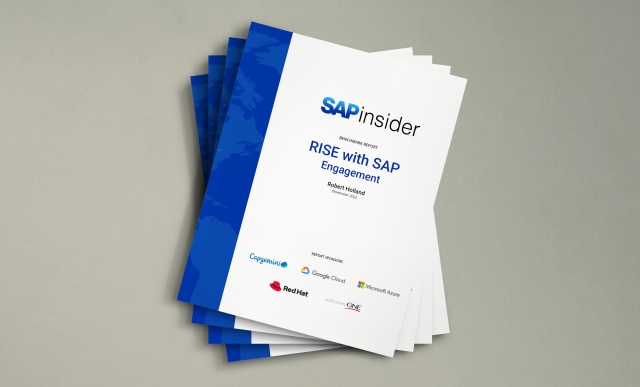Find out about a new approach to conducting an efficient and effective interview to ensure that your SAP HR/HCM consultants are the best matches for your team. See how you can spot false claims and learn how to separate the ideal candidates from the rest of the crowd.
Key Concept
A technical interview is an interview that assesses a candidate’s knowledge, experience, and understanding of SAP HR. It’s usually the second round of interviews after the first more general introductory interview.
During the course of hundreds, and possibly thousands, of interviews, I have developed a list of top tips for finding a good SAP HR consultant among the thousands of potential candidates. Chief among those tips is that you take the time to develop a good technical interview.
A good technical interview is the fastest way to sort the wheat from the chaff. It doesn’t matter how good a candidate’s CVs is. If a candidate can’t demonstrate technical competency in the interview, then chances are he or she is not going to be an asset to your company.
Traditionally a technical interview was based on checking a candidate’s knowledge of SAP HR by testing knowledge of the IMG and recall of table names and infotype numbers. However, because of the increasing complexity of the various SAP HR modules, technical interviews are becoming more complex and tailored to the specifics of the role.
For example, when preparing an interview for a potential candidate for a payroll role, keep in mind that the candidate needs to have a good understanding of local legislation and law as well as configuration skills to build the correct solution in an SAP system. However, for benefits consultants working in a component that is not as tied to statutory laws, an interview should focus on their understanding of the capabilities of the benefits component, so that clients’ requirements can be built into the system.
Here are some ideas to consider the next time you interview for a role on your team. For my complete list of tips for hiring good SAP HR consultants, see the sidebar, “Six More Good Hiring Practices.” You can share those tips with your HR department or colleagues.
The Technical Questionnaire
It’s not enough for a candidate to be able to name all of the tables and transactions in SAP HR. What is more important is that a candidate be able to describe what they are used for and what they can do. Similarly you need to tailor different interviews for recruiting employees into support versus implementation roles. A support person needs to be able to demonstrate problem-solving skills as well as a good understanding of the capabilities of the system and configuration process.
A key benefit of developing a set of technical interviews tailored to specific roles within SAP HR is that it gives you a quantitative measure of candidates’ capabilities. After conducting half a dozen technical interviews using the same technical interview questionnaire, you can rank the candidates on a scale knowing that you have interviewed them in a consistent, measurable, and repeatable process.
A good pointer for developing a technical interview questionnaire is to use business scenarios and issues your company is currently facing as a basis for the questions. Remember when asking the questions that you are not looking for an actual solution (but be glad if you get one). What you are looking for is the candidates’ demonstration of problem-solving skills, investigation techniques, and knowledge of the system.
I am sure anyone involved in SAP HCM can think of some business scenarios that they have faced recently that would translate into good interview questions, but here are some examples of questions that I have found to be a good way of measuring a candidate’s capabilities:
When looking for a personnel administration consultant: We have offices around the world and employees moving between the offices frequently. How can we control the fields that are available for input on infotypes depending on which country the employee is working in, and how can we ensure that employee data is only visible to the relevant country HR team?
When interviewing for a payroll consultant: A member of the finance team has reported that the posting figures for a specific employee look strange. Can you please explain the process you would follow to verify that the posting results and payroll results are correct?
When interviewing for a benefits consultant: We have a business requirement in our organization for an employee share plan that is to be offered to employees who have more than 10 years of service, are paid weekly, and work in our northwestern offices. Can you tell us if this is going to be possible via standard configuration, and, if so, how you would control the enrollment in this plan to just that group of employees?
When interviewing for an organizational management consultant: Within our company the hierarchy for workflow approvals is vastly different from our organizational structure hierarchy. Will it be possible to build an organizational structure that meets our reporting requirements and our workflow approval requirements without creating a maintenance nightmare?
For a compensation management consultant: We manage our compensation pot through a tightly controlled budget and a definite set of criteria, but we need the ability to override this budget to cater to extraordinary performances by members of our sales team. How can we set up a budget and compensation plan that is tightly controlled but allows the occasional override?
If you don’t think you have the in-house skills to develop a set of technical interview questionnaires, then here is a chance to make use of your SAP HR network. The cost of bringing in a subject matter expert for a day or two to help you develop your technical interview questionnaire is going to be a lot less than the cost associated with hiring an under-qualified candidate into your company.
Given the number of interview questions and answers already available on the Internet, it’s a good idea to check to make sure the answers to your questions are not already widely available. This is less likely to happen if you develop questions based on your company’s own scenarios and issues.
During the Interview
Remember during the interview not to ask leading questions. Although it’s painful to listen to candidates struggle when faced with questions they don’t understand or can’t answer, be careful when you rephrase the question so that you do not to give the answer away. For example, when talking about organizational management if you ask, “When working on the organizational structure, do you prefer the newer visual mode or the expert mode to edit the structure?” you are telling the candidate that there are two ways to view the organizational structure — one of which is newer and presumably better.
Instead you could ask them, “Can you describe the different ways that you can edit the organizational structure, and who they are most appropriate for?” By asking a more open question, you are forcing candidates to show more of their knowledge of the system and its capabilities and thus demonstrating the depth of their understanding.
Six More Good SAP HR Hiring Practices
It seems as if SAP HR has become something of a victim of its own success. Whereas 10 years ago few people even knew of SAP HR, now it seems that anyone who can spell SAP and HR is claiming to be an expert. Fake CVs are clogging up our email inboxes and making it harder and harder to find the real HR experts.
Everyone has heard stories of people claiming experience they didn’t have, or working on projects that they weren’t part of. I have even encountered people using an experienced friend or paid imposter to pose as them in technical interviews. So the big question is how do you find good SAP HR consultants? Here are some of my tips for helping to find good HR consultants:
1. Know what you want and when you want it.
Although the nature of the SAP HR industry means it’s sometimes hard to plan ahead with certainty, it’s important to start the recruitment process as early as possible. This is especially true when looking for contractors, as good contractors are snapped up well before they finish their existing contract. Both contractors and permanent staff are often committed to their next role or project before they finish their existing one, so by getting in early you are more likely to find them open to changing jobs or starting new contracts with your company.
It’s also important to define exactly what you want. It’s not enough to advertise for a “SAP HR consultant” anymore. The range of specialities and skills within SAP HR means that you need to be much more specific about the skills that you require. If you need someone with E-Recruitment experience then you need to specify that in your advertisements.
2. Start off by using your SAP HR network.
The SAP HR world is much smaller than you think. The network of people that you have met in your SAP career who could provide potential candidates could include literally hundreds of people ranging from:
- Existing team members
- Consulting colleagues
- Client team members
- Fellow training course delegates
- Contacts made at industry conferences and social events
- Regular posters on SAP-related Web sites
By working to keep this network active and up to date you can then call on these people to suggest suitable candidates when a need arrives. You can also find out great pieces of market knowledge from your network. For example, a large global rollout recently came to an end, which allowed us to be in a position to grab the people that we wanted before the news was formally announced and the recruitment agents started to call.
3. Thoroughly review the CV.
Simply right-clicking on a CV file and reading the document properties (including the author and company of the document) can tell you a lot about the source of the CV you are reading. You might be amazed what you find out when you see that a CV submitted by Employee X currently of Acme Incorporated was actually originally written by Employee Y of TBC consulting. It could be that Employee X legitimately used Employee Y’s CV as a base for his own, but it also could be a case of misrepresentation. If you do find a difference, asking the author about this difference is totally legitimate.
Also check the CV for small details as well as the content. Check for style and formatting, because a well written and consistent CV is a sign of a person with good attention to detail (a skill that is always in demand). A CV with layout and font changes and with bullet points swapped for numbered lists mid-way through the document could be a sign that this CV is a “cut and paste job” cobbled together by taking parts of several different people’s CV and presenting it as a new fake CV.
4. Verify the claims of the CV.
CVs list easily verifiable facts and figures that are usually quite simple to verify.
Using your network of contacts you can probably quickly verify many of these facts. People in your network may sometimes become a bit nervous if asked subjective questions about a workmate or former colleague, but most people are quite comfortable to tell objective facts (i.e., if the person in question was actually on a particular project, if he or she was there working as a payroll consultant, and if the responsibilities did include configuring the posting to finance).
5. Use a video conference to get to know your candidates.
Once you have reviewed your list of CVs, the next step is the vital initial interview, which in the past has been via telephone. However, as demand for HR consultants continues to rise, the number of people willing to misrepresent themselves also continues to rise. One of the tricks that is becoming more common is using an experienced friend or colleague in the phone interview to get through the first stages. Another is using a list of commonly asked questions and answers to refer to during the phone interview. You can overcome both by using a video conference to get to know your candidates. Another advantage of this method is that the interview can be performed out of the candidate’s work time, saving on those rushed interviews we have all tried to attend between team meetings and deadlines at work.
Actually seeing a candidate face to face (even if it’s only online) is invaluable. Sure, some people do legitimately use notesas part of their interview prep, but these people will probably be happy to be seen using these.
6. Trust attitude over experience.
Sometimes no matter how hard you try, it’s hard to find a person with the exact skills you require. Given the constantly changing and evolving nature of SAP HR, demand often exceeds supply when it comes to skills in new components and modules. So if you can’t find the exact right skill set in your candidates, try to find someone who has skills in a similar or related component, but who can also demonstrate the right attitude for learning new things and getting new components up and running.
A good tip is to watch out for vague or evasive answers. Someone who doesn’t know the answer to a question should be confident enough to say so. No one knows everything, but what is important is that they can tell you how they would investigate/understand/learn about the area to find out the answer.
I think it’s a good idea to be aware of anyone who rates their knowledge in a component as 10 out of a possible 10. Any really experienced SAP consultant knows enough to know he or she doesn’t know everything and is unlikely to give themselves a perfect 10 for knowledge.
Greg Newman
Greg Newman is originally from New Zealand, and has been implementing and supporting HR and Payroll systems since 1999. He has worked on numerous SAP HR and Payroll implementations for Great Britain, the Republic of Ireland, Australia, New Zealand, and several other international rollouts. Currently Greg is a managing consultant working for Newhit HR and Payroll Solutions in England.
You may contact the author at greg.newman@saphr.com.
If you have comments about this article or publication, or would like to submit an article idea, please contact the editor.





